Health Sociology (HSC210) Assignment: Short Answer Questions
VerifiedAdded on 2023/01/11
|10
|3210
|23
Homework Assignment
AI Summary
This assignment delves into key concepts in health sociology, examining the interplay between society and health outcomes. It addresses questions on postmodernist perspectives and their implications for health practice, explores the persistent challenges in Indigenous health despite increased funding, and analyzes psychiatry's role as a mechanism of social control through sociological theories. The assignment also evaluates the benefits and limitations of e-health, investigates how ideology and politics shape health outcomes, discusses functionalist theory's mechanisms, and defines medical dominance within the Australian context. Additionally, it explains discourse's relevance to health and biomedicine, explores multiculturalism's impact on health needs of immigrants and refugees, and examines the social determinants of health within a globalized and inequitable world. The solutions provided offer comprehensive insights into these critical aspects of health sociology, offering valuable information for students.
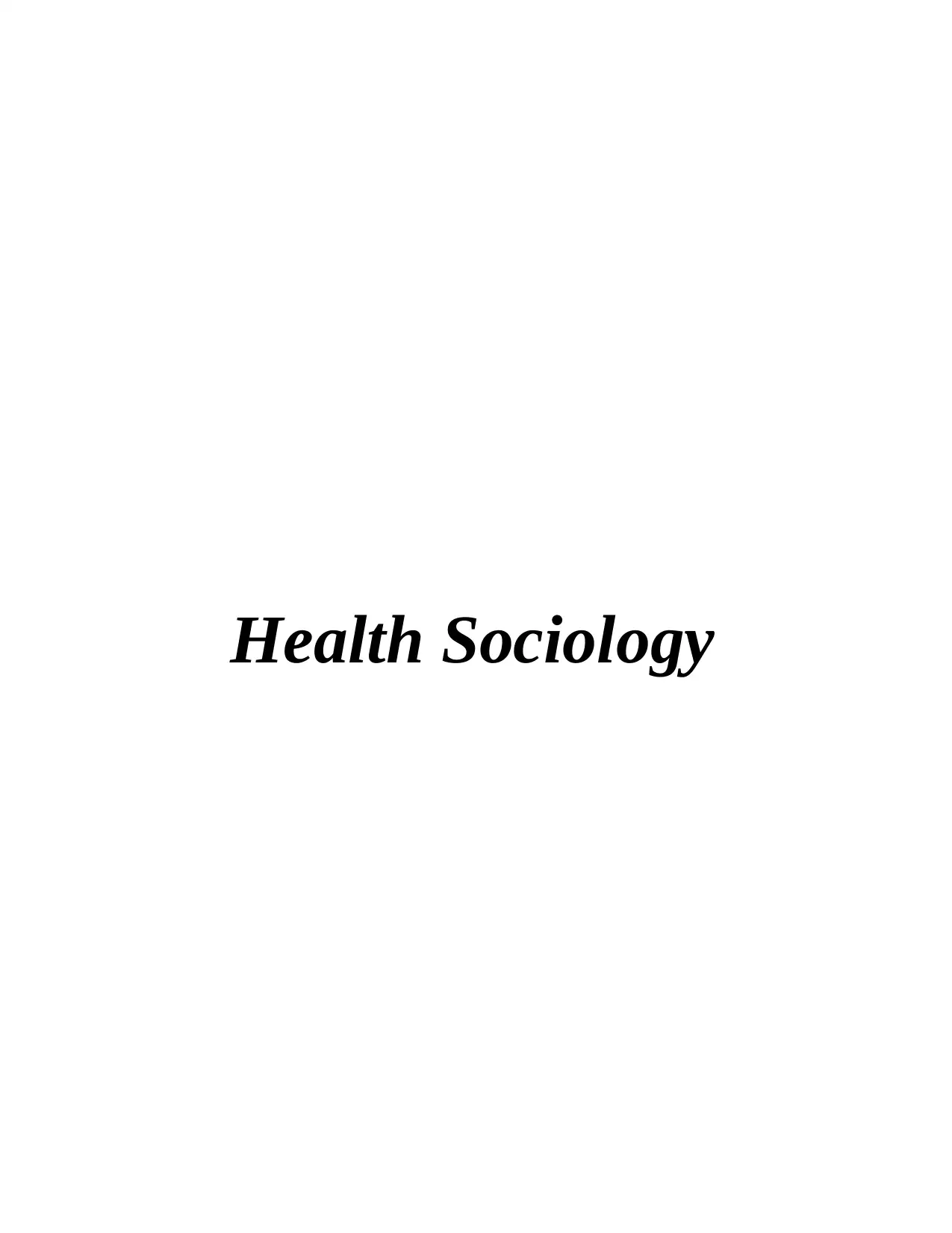
Health Sociology
Paraphrase This Document
Need a fresh take? Get an instant paraphrase of this document with our AI Paraphraser
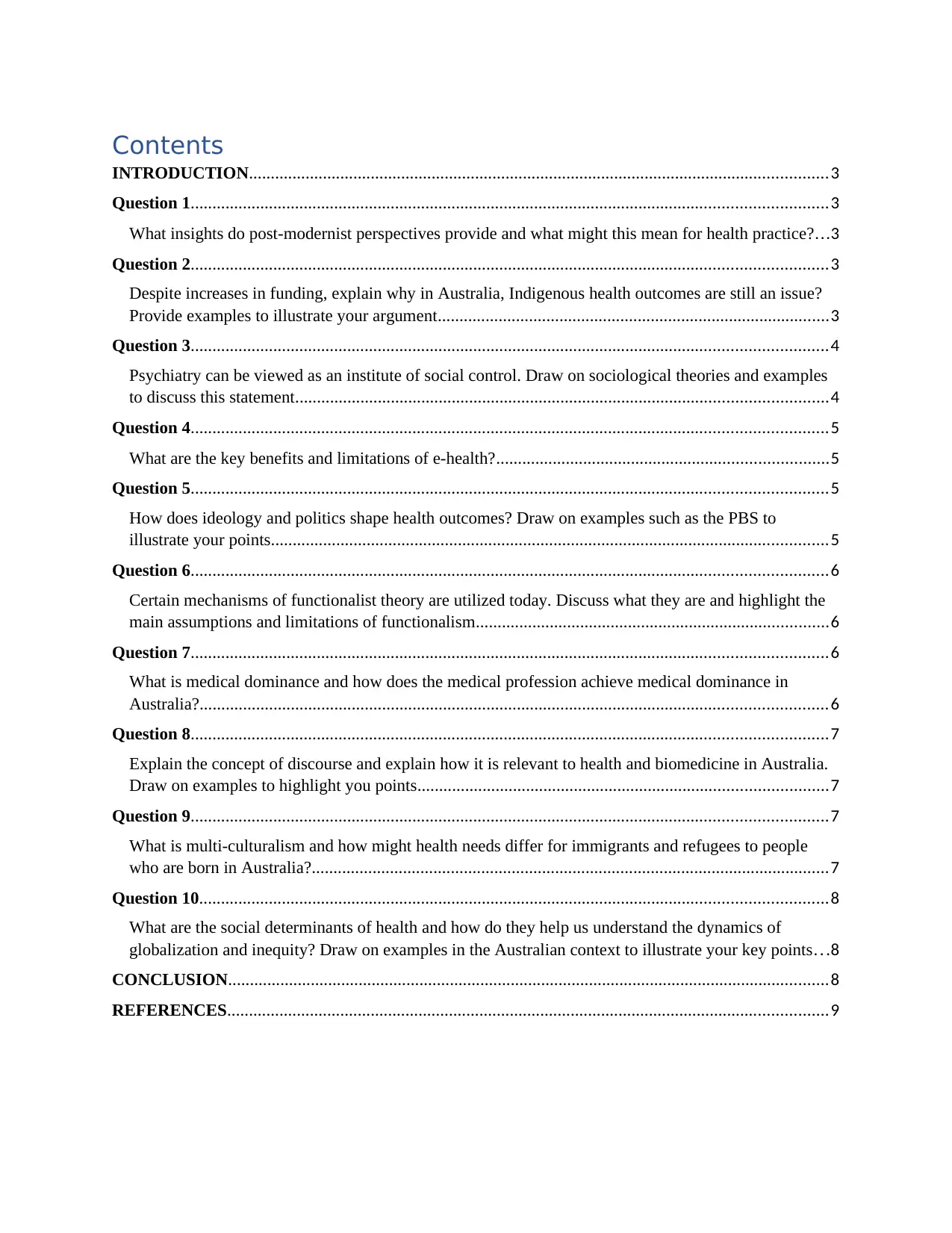
Contents
INTRODUCTION.....................................................................................................................................3
Question 1..................................................................................................................................................3
What insights do post-modernist perspectives provide and what might this mean for health practice?...3
Question 2..................................................................................................................................................3
Despite increases in funding, explain why in Australia, Indigenous health outcomes are still an issue?
Provide examples to illustrate your argument..........................................................................................3
Question 3..................................................................................................................................................4
Psychiatry can be viewed as an institute of social control. Draw on sociological theories and examples
to discuss this statement..........................................................................................................................4
Question 4..................................................................................................................................................5
What are the key benefits and limitations of e-health?............................................................................5
Question 5..................................................................................................................................................5
How does ideology and politics shape health outcomes? Draw on examples such as the PBS to
illustrate your points................................................................................................................................5
Question 6..................................................................................................................................................6
Certain mechanisms of functionalist theory are utilized today. Discuss what they are and highlight the
main assumptions and limitations of functionalism.................................................................................6
Question 7..................................................................................................................................................6
What is medical dominance and how does the medical profession achieve medical dominance in
Australia?................................................................................................................................................6
Question 8..................................................................................................................................................7
Explain the concept of discourse and explain how it is relevant to health and biomedicine in Australia.
Draw on examples to highlight you points..............................................................................................7
Question 9..................................................................................................................................................7
What is multi-culturalism and how might health needs differ for immigrants and refugees to people
who are born in Australia?.......................................................................................................................7
Question 10................................................................................................................................................8
What are the social determinants of health and how do they help us understand the dynamics of
globalization and inequity? Draw on examples in the Australian context to illustrate your key points. . .8
CONCLUSION..........................................................................................................................................8
REFERENCES..........................................................................................................................................9
INTRODUCTION.....................................................................................................................................3
Question 1..................................................................................................................................................3
What insights do post-modernist perspectives provide and what might this mean for health practice?...3
Question 2..................................................................................................................................................3
Despite increases in funding, explain why in Australia, Indigenous health outcomes are still an issue?
Provide examples to illustrate your argument..........................................................................................3
Question 3..................................................................................................................................................4
Psychiatry can be viewed as an institute of social control. Draw on sociological theories and examples
to discuss this statement..........................................................................................................................4
Question 4..................................................................................................................................................5
What are the key benefits and limitations of e-health?............................................................................5
Question 5..................................................................................................................................................5
How does ideology and politics shape health outcomes? Draw on examples such as the PBS to
illustrate your points................................................................................................................................5
Question 6..................................................................................................................................................6
Certain mechanisms of functionalist theory are utilized today. Discuss what they are and highlight the
main assumptions and limitations of functionalism.................................................................................6
Question 7..................................................................................................................................................6
What is medical dominance and how does the medical profession achieve medical dominance in
Australia?................................................................................................................................................6
Question 8..................................................................................................................................................7
Explain the concept of discourse and explain how it is relevant to health and biomedicine in Australia.
Draw on examples to highlight you points..............................................................................................7
Question 9..................................................................................................................................................7
What is multi-culturalism and how might health needs differ for immigrants and refugees to people
who are born in Australia?.......................................................................................................................7
Question 10................................................................................................................................................8
What are the social determinants of health and how do they help us understand the dynamics of
globalization and inequity? Draw on examples in the Australian context to illustrate your key points. . .8
CONCLUSION..........................................................................................................................................8
REFERENCES..........................................................................................................................................9
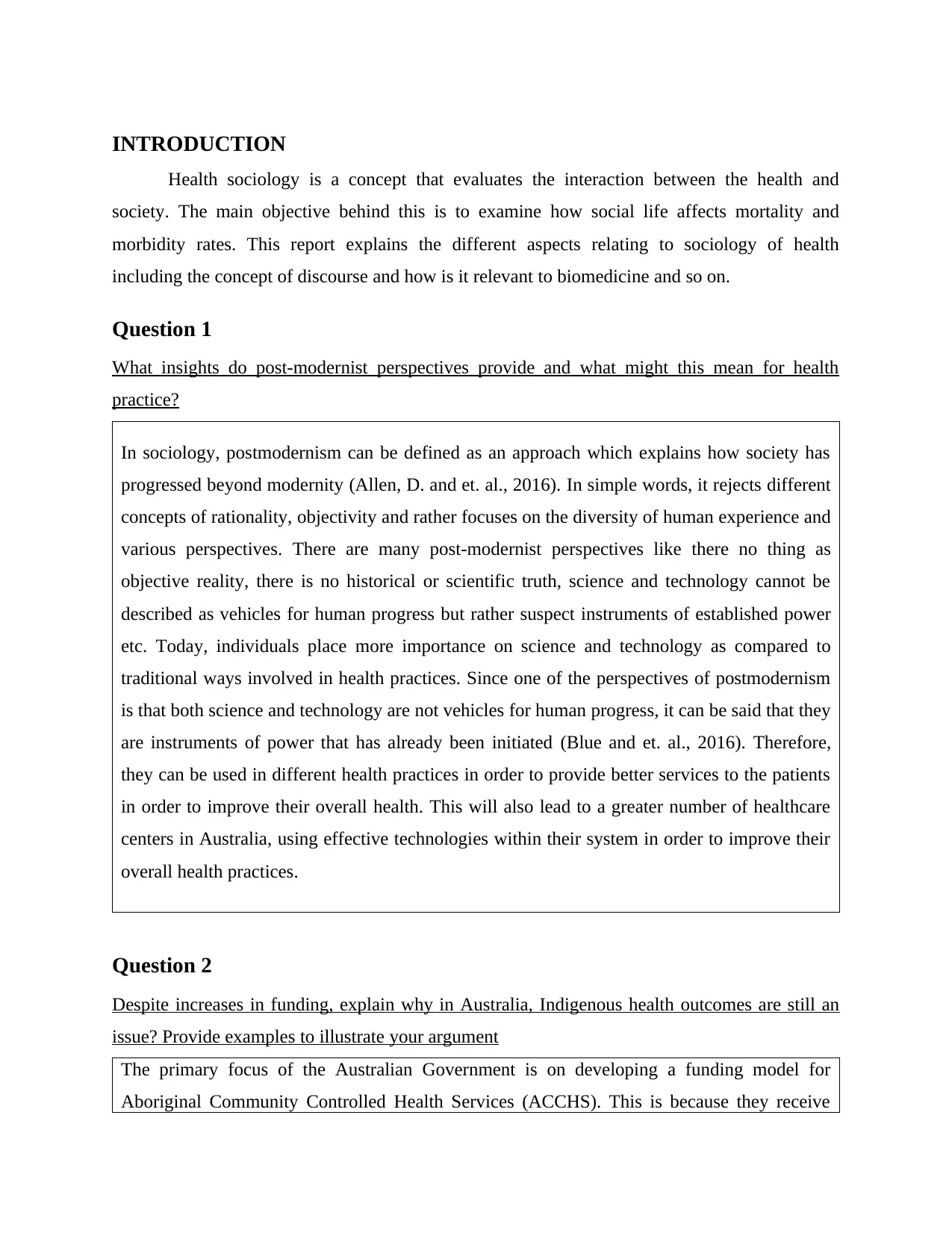
INTRODUCTION
Health sociology is a concept that evaluates the interaction between the health and
society. The main objective behind this is to examine how social life affects mortality and
morbidity rates. This report explains the different aspects relating to sociology of health
including the concept of discourse and how is it relevant to biomedicine and so on.
Question 1
What insights do post-modernist perspectives provide and what might this mean for health
practice?
In sociology, postmodernism can be defined as an approach which explains how society has
progressed beyond modernity (Allen, D. and et. al., 2016). In simple words, it rejects different
concepts of rationality, objectivity and rather focuses on the diversity of human experience and
various perspectives. There are many post-modernist perspectives like there no thing as
objective reality, there is no historical or scientific truth, science and technology cannot be
described as vehicles for human progress but rather suspect instruments of established power
etc. Today, individuals place more importance on science and technology as compared to
traditional ways involved in health practices. Since one of the perspectives of postmodernism
is that both science and technology are not vehicles for human progress, it can be said that they
are instruments of power that has already been initiated (Blue and et. al., 2016). Therefore,
they can be used in different health practices in order to provide better services to the patients
in order to improve their overall health. This will also lead to a greater number of healthcare
centers in Australia, using effective technologies within their system in order to improve their
overall health practices.
Question 2
Despite increases in funding, explain why in Australia, Indigenous health outcomes are still an
issue? Provide examples to illustrate your argument
The primary focus of the Australian Government is on developing a funding model for
Aboriginal Community Controlled Health Services (ACCHS). This is because they receive
Health sociology is a concept that evaluates the interaction between the health and
society. The main objective behind this is to examine how social life affects mortality and
morbidity rates. This report explains the different aspects relating to sociology of health
including the concept of discourse and how is it relevant to biomedicine and so on.
Question 1
What insights do post-modernist perspectives provide and what might this mean for health
practice?
In sociology, postmodernism can be defined as an approach which explains how society has
progressed beyond modernity (Allen, D. and et. al., 2016). In simple words, it rejects different
concepts of rationality, objectivity and rather focuses on the diversity of human experience and
various perspectives. There are many post-modernist perspectives like there no thing as
objective reality, there is no historical or scientific truth, science and technology cannot be
described as vehicles for human progress but rather suspect instruments of established power
etc. Today, individuals place more importance on science and technology as compared to
traditional ways involved in health practices. Since one of the perspectives of postmodernism
is that both science and technology are not vehicles for human progress, it can be said that they
are instruments of power that has already been initiated (Blue and et. al., 2016). Therefore,
they can be used in different health practices in order to provide better services to the patients
in order to improve their overall health. This will also lead to a greater number of healthcare
centers in Australia, using effective technologies within their system in order to improve their
overall health practices.
Question 2
Despite increases in funding, explain why in Australia, Indigenous health outcomes are still an
issue? Provide examples to illustrate your argument
The primary focus of the Australian Government is on developing a funding model for
Aboriginal Community Controlled Health Services (ACCHS). This is because they receive
⊘ This is a preview!⊘
Do you want full access?
Subscribe today to unlock all pages.

Trusted by 1+ million students worldwide
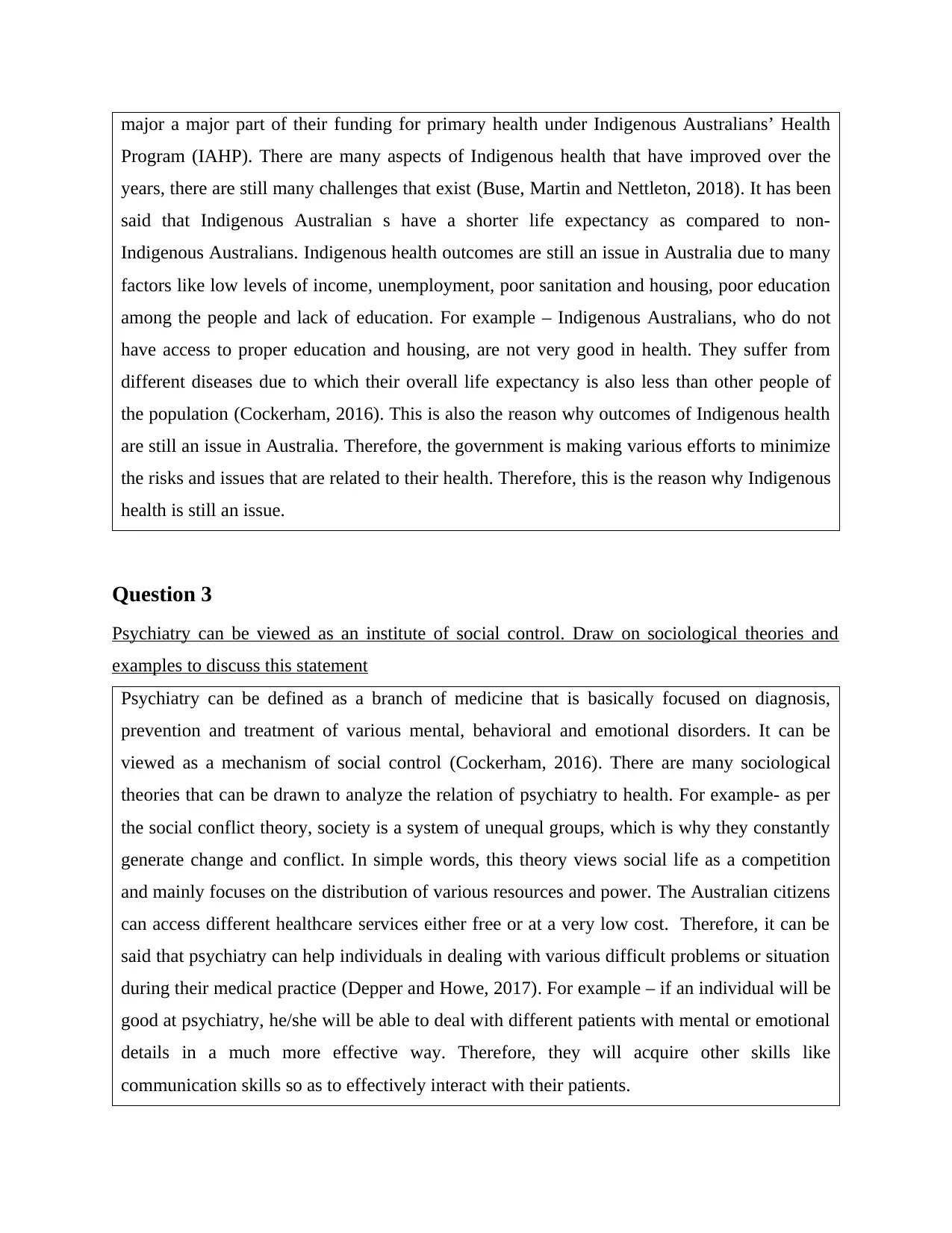
major a major part of their funding for primary health under Indigenous Australians’ Health
Program (IAHP). There are many aspects of Indigenous health that have improved over the
years, there are still many challenges that exist (Buse, Martin and Nettleton, 2018). It has been
said that Indigenous Australian s have a shorter life expectancy as compared to non-
Indigenous Australians. Indigenous health outcomes are still an issue in Australia due to many
factors like low levels of income, unemployment, poor sanitation and housing, poor education
among the people and lack of education. For example – Indigenous Australians, who do not
have access to proper education and housing, are not very good in health. They suffer from
different diseases due to which their overall life expectancy is also less than other people of
the population (Cockerham, 2016). This is also the reason why outcomes of Indigenous health
are still an issue in Australia. Therefore, the government is making various efforts to minimize
the risks and issues that are related to their health. Therefore, this is the reason why Indigenous
health is still an issue.
Question 3
Psychiatry can be viewed as an institute of social control. Draw on sociological theories and
examples to discuss this statement
Psychiatry can be defined as a branch of medicine that is basically focused on diagnosis,
prevention and treatment of various mental, behavioral and emotional disorders. It can be
viewed as a mechanism of social control (Cockerham, 2016). There are many sociological
theories that can be drawn to analyze the relation of psychiatry to health. For example- as per
the social conflict theory, society is a system of unequal groups, which is why they constantly
generate change and conflict. In simple words, this theory views social life as a competition
and mainly focuses on the distribution of various resources and power. The Australian citizens
can access different healthcare services either free or at a very low cost. Therefore, it can be
said that psychiatry can help individuals in dealing with various difficult problems or situation
during their medical practice (Depper and Howe, 2017). For example – if an individual will be
good at psychiatry, he/she will be able to deal with different patients with mental or emotional
details in a much more effective way. Therefore, they will acquire other skills like
communication skills so as to effectively interact with their patients.
Program (IAHP). There are many aspects of Indigenous health that have improved over the
years, there are still many challenges that exist (Buse, Martin and Nettleton, 2018). It has been
said that Indigenous Australian s have a shorter life expectancy as compared to non-
Indigenous Australians. Indigenous health outcomes are still an issue in Australia due to many
factors like low levels of income, unemployment, poor sanitation and housing, poor education
among the people and lack of education. For example – Indigenous Australians, who do not
have access to proper education and housing, are not very good in health. They suffer from
different diseases due to which their overall life expectancy is also less than other people of
the population (Cockerham, 2016). This is also the reason why outcomes of Indigenous health
are still an issue in Australia. Therefore, the government is making various efforts to minimize
the risks and issues that are related to their health. Therefore, this is the reason why Indigenous
health is still an issue.
Question 3
Psychiatry can be viewed as an institute of social control. Draw on sociological theories and
examples to discuss this statement
Psychiatry can be defined as a branch of medicine that is basically focused on diagnosis,
prevention and treatment of various mental, behavioral and emotional disorders. It can be
viewed as a mechanism of social control (Cockerham, 2016). There are many sociological
theories that can be drawn to analyze the relation of psychiatry to health. For example- as per
the social conflict theory, society is a system of unequal groups, which is why they constantly
generate change and conflict. In simple words, this theory views social life as a competition
and mainly focuses on the distribution of various resources and power. The Australian citizens
can access different healthcare services either free or at a very low cost. Therefore, it can be
said that psychiatry can help individuals in dealing with various difficult problems or situation
during their medical practice (Depper and Howe, 2017). For example – if an individual will be
good at psychiatry, he/she will be able to deal with different patients with mental or emotional
details in a much more effective way. Therefore, they will acquire other skills like
communication skills so as to effectively interact with their patients.
Paraphrase This Document
Need a fresh take? Get an instant paraphrase of this document with our AI Paraphraser
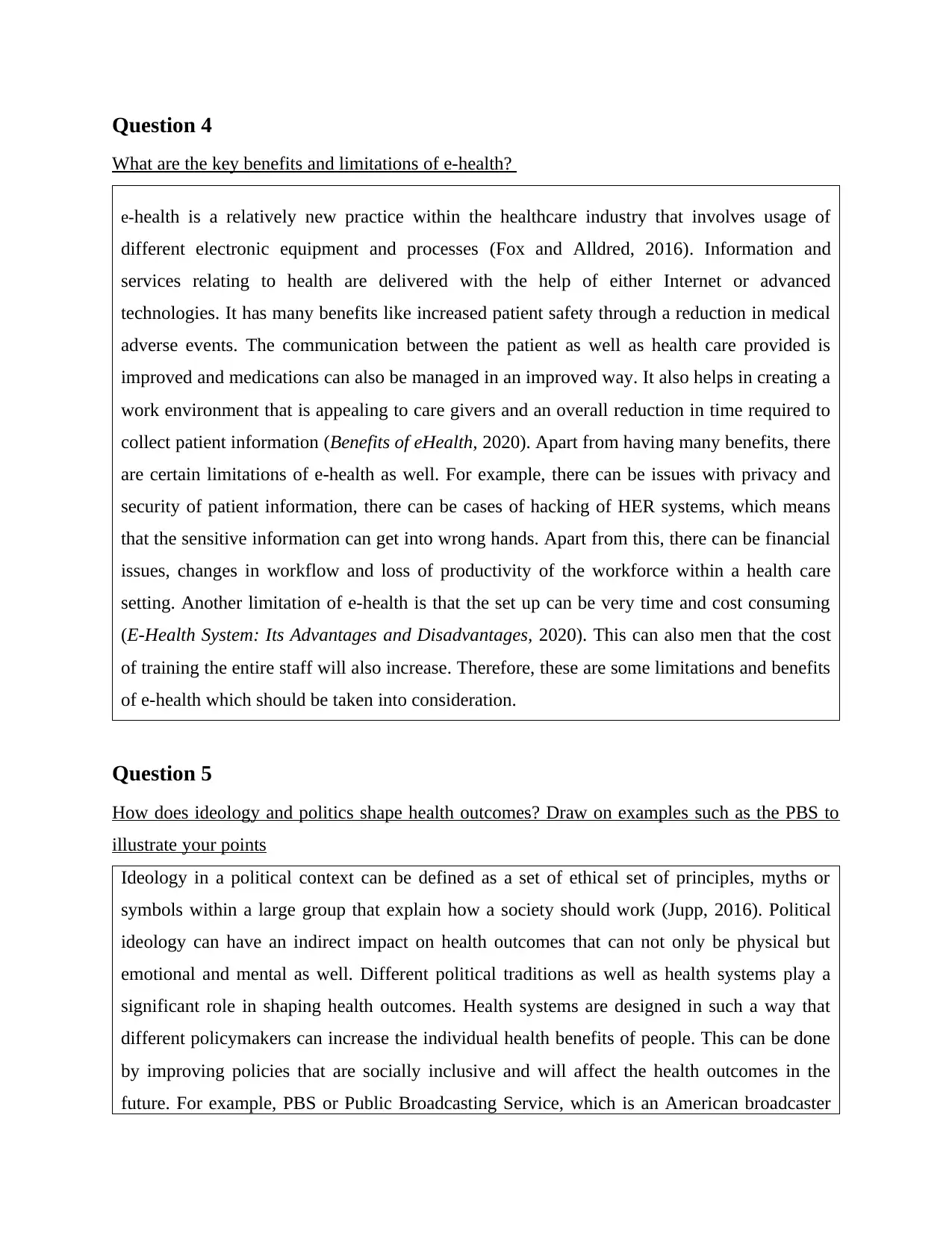
Question 4
What are the key benefits and limitations of e-health?
e-health is a relatively new practice within the healthcare industry that involves usage of
different electronic equipment and processes (Fox and Alldred, 2016). Information and
services relating to health are delivered with the help of either Internet or advanced
technologies. It has many benefits like increased patient safety through a reduction in medical
adverse events. The communication between the patient as well as health care provided is
improved and medications can also be managed in an improved way. It also helps in creating a
work environment that is appealing to care givers and an overall reduction in time required to
collect patient information (Benefits of eHealth, 2020). Apart from having many benefits, there
are certain limitations of e-health as well. For example, there can be issues with privacy and
security of patient information, there can be cases of hacking of HER systems, which means
that the sensitive information can get into wrong hands. Apart from this, there can be financial
issues, changes in workflow and loss of productivity of the workforce within a health care
setting. Another limitation of e-health is that the set up can be very time and cost consuming
(E-Health System: Its Advantages and Disadvantages, 2020). This can also men that the cost
of training the entire staff will also increase. Therefore, these are some limitations and benefits
of e-health which should be taken into consideration.
Question 5
How does ideology and politics shape health outcomes? Draw on examples such as the PBS to
illustrate your points
Ideology in a political context can be defined as a set of ethical set of principles, myths or
symbols within a large group that explain how a society should work (Jupp, 2016). Political
ideology can have an indirect impact on health outcomes that can not only be physical but
emotional and mental as well. Different political traditions as well as health systems play a
significant role in shaping health outcomes. Health systems are designed in such a way that
different policymakers can increase the individual health benefits of people. This can be done
by improving policies that are socially inclusive and will affect the health outcomes in the
future. For example, PBS or Public Broadcasting Service, which is an American broadcaster
What are the key benefits and limitations of e-health?
e-health is a relatively new practice within the healthcare industry that involves usage of
different electronic equipment and processes (Fox and Alldred, 2016). Information and
services relating to health are delivered with the help of either Internet or advanced
technologies. It has many benefits like increased patient safety through a reduction in medical
adverse events. The communication between the patient as well as health care provided is
improved and medications can also be managed in an improved way. It also helps in creating a
work environment that is appealing to care givers and an overall reduction in time required to
collect patient information (Benefits of eHealth, 2020). Apart from having many benefits, there
are certain limitations of e-health as well. For example, there can be issues with privacy and
security of patient information, there can be cases of hacking of HER systems, which means
that the sensitive information can get into wrong hands. Apart from this, there can be financial
issues, changes in workflow and loss of productivity of the workforce within a health care
setting. Another limitation of e-health is that the set up can be very time and cost consuming
(E-Health System: Its Advantages and Disadvantages, 2020). This can also men that the cost
of training the entire staff will also increase. Therefore, these are some limitations and benefits
of e-health which should be taken into consideration.
Question 5
How does ideology and politics shape health outcomes? Draw on examples such as the PBS to
illustrate your points
Ideology in a political context can be defined as a set of ethical set of principles, myths or
symbols within a large group that explain how a society should work (Jupp, 2016). Political
ideology can have an indirect impact on health outcomes that can not only be physical but
emotional and mental as well. Different political traditions as well as health systems play a
significant role in shaping health outcomes. Health systems are designed in such a way that
different policymakers can increase the individual health benefits of people. This can be done
by improving policies that are socially inclusive and will affect the health outcomes in the
future. For example, PBS or Public Broadcasting Service, which is an American broadcaster
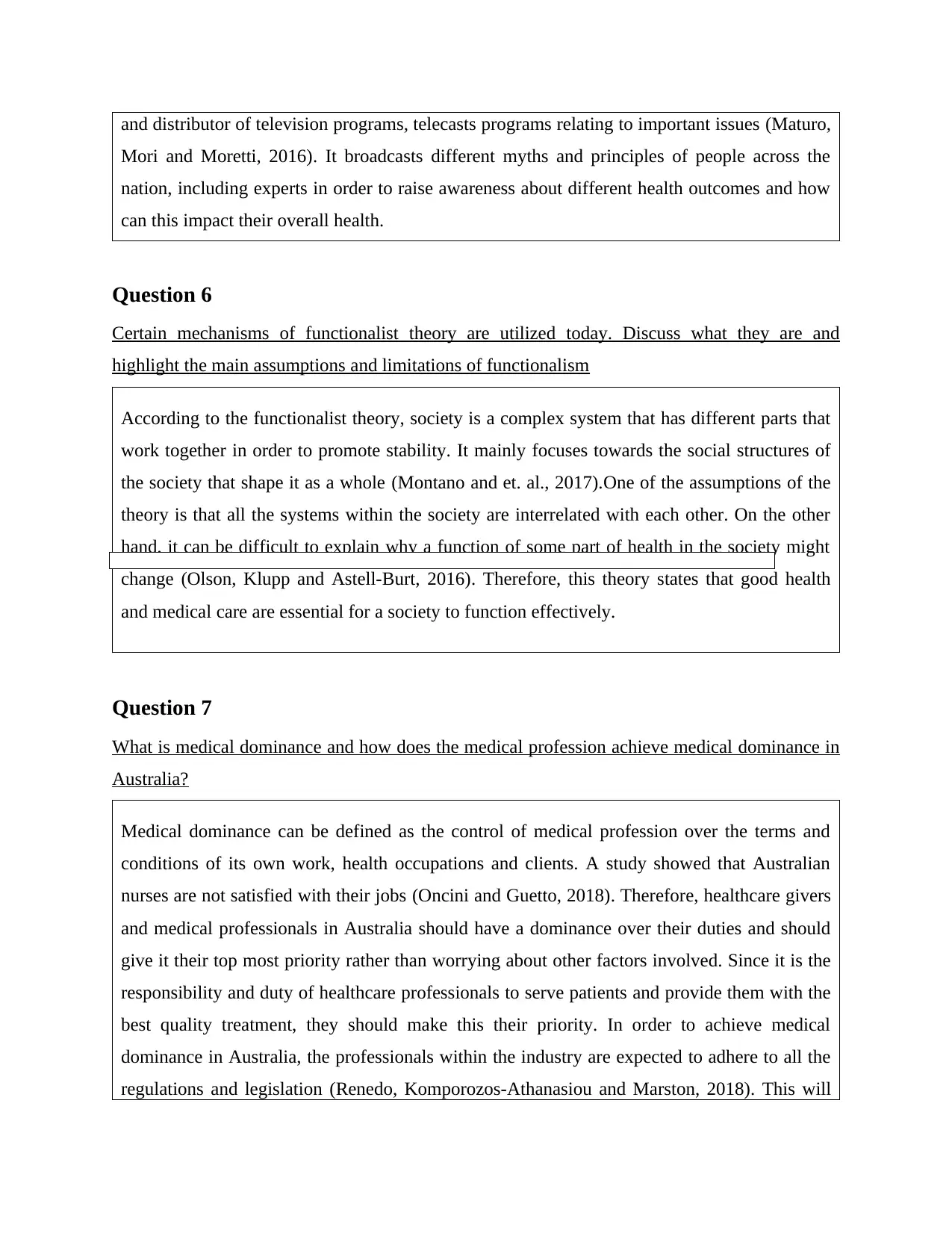
and distributor of television programs, telecasts programs relating to important issues (Maturo,
Mori and Moretti, 2016). It broadcasts different myths and principles of people across the
nation, including experts in order to raise awareness about different health outcomes and how
can this impact their overall health.
Question 6
Certain mechanisms of functionalist theory are utilized today. Discuss what they are and
highlight the main assumptions and limitations of functionalism
According to the functionalist theory, society is a complex system that has different parts that
work together in order to promote stability. It mainly focuses towards the social structures of
the society that shape it as a whole (Montano and et. al., 2017).One of the assumptions of the
theory is that all the systems within the society are interrelated with each other. On the other
hand, it can be difficult to explain why a function of some part of health in the society might
change (Olson, Klupp and Astell-Burt, 2016). Therefore, this theory states that good health
and medical care are essential for a society to function effectively.
Question 7
What is medical dominance and how does the medical profession achieve medical dominance in
Australia?
Medical dominance can be defined as the control of medical profession over the terms and
conditions of its own work, health occupations and clients. A study showed that Australian
nurses are not satisfied with their jobs (Oncini and Guetto, 2018). Therefore, healthcare givers
and medical professionals in Australia should have a dominance over their duties and should
give it their top most priority rather than worrying about other factors involved. Since it is the
responsibility and duty of healthcare professionals to serve patients and provide them with the
best quality treatment, they should make this their priority. In order to achieve medical
dominance in Australia, the professionals within the industry are expected to adhere to all the
regulations and legislation (Renedo, Komporozos-Athanasiou and Marston, 2018). This will
Mori and Moretti, 2016). It broadcasts different myths and principles of people across the
nation, including experts in order to raise awareness about different health outcomes and how
can this impact their overall health.
Question 6
Certain mechanisms of functionalist theory are utilized today. Discuss what they are and
highlight the main assumptions and limitations of functionalism
According to the functionalist theory, society is a complex system that has different parts that
work together in order to promote stability. It mainly focuses towards the social structures of
the society that shape it as a whole (Montano and et. al., 2017).One of the assumptions of the
theory is that all the systems within the society are interrelated with each other. On the other
hand, it can be difficult to explain why a function of some part of health in the society might
change (Olson, Klupp and Astell-Burt, 2016). Therefore, this theory states that good health
and medical care are essential for a society to function effectively.
Question 7
What is medical dominance and how does the medical profession achieve medical dominance in
Australia?
Medical dominance can be defined as the control of medical profession over the terms and
conditions of its own work, health occupations and clients. A study showed that Australian
nurses are not satisfied with their jobs (Oncini and Guetto, 2018). Therefore, healthcare givers
and medical professionals in Australia should have a dominance over their duties and should
give it their top most priority rather than worrying about other factors involved. Since it is the
responsibility and duty of healthcare professionals to serve patients and provide them with the
best quality treatment, they should make this their priority. In order to achieve medical
dominance in Australia, the professionals within the industry are expected to adhere to all the
regulations and legislation (Renedo, Komporozos-Athanasiou and Marston, 2018). This will
⊘ This is a preview!⊘
Do you want full access?
Subscribe today to unlock all pages.

Trusted by 1+ million students worldwide
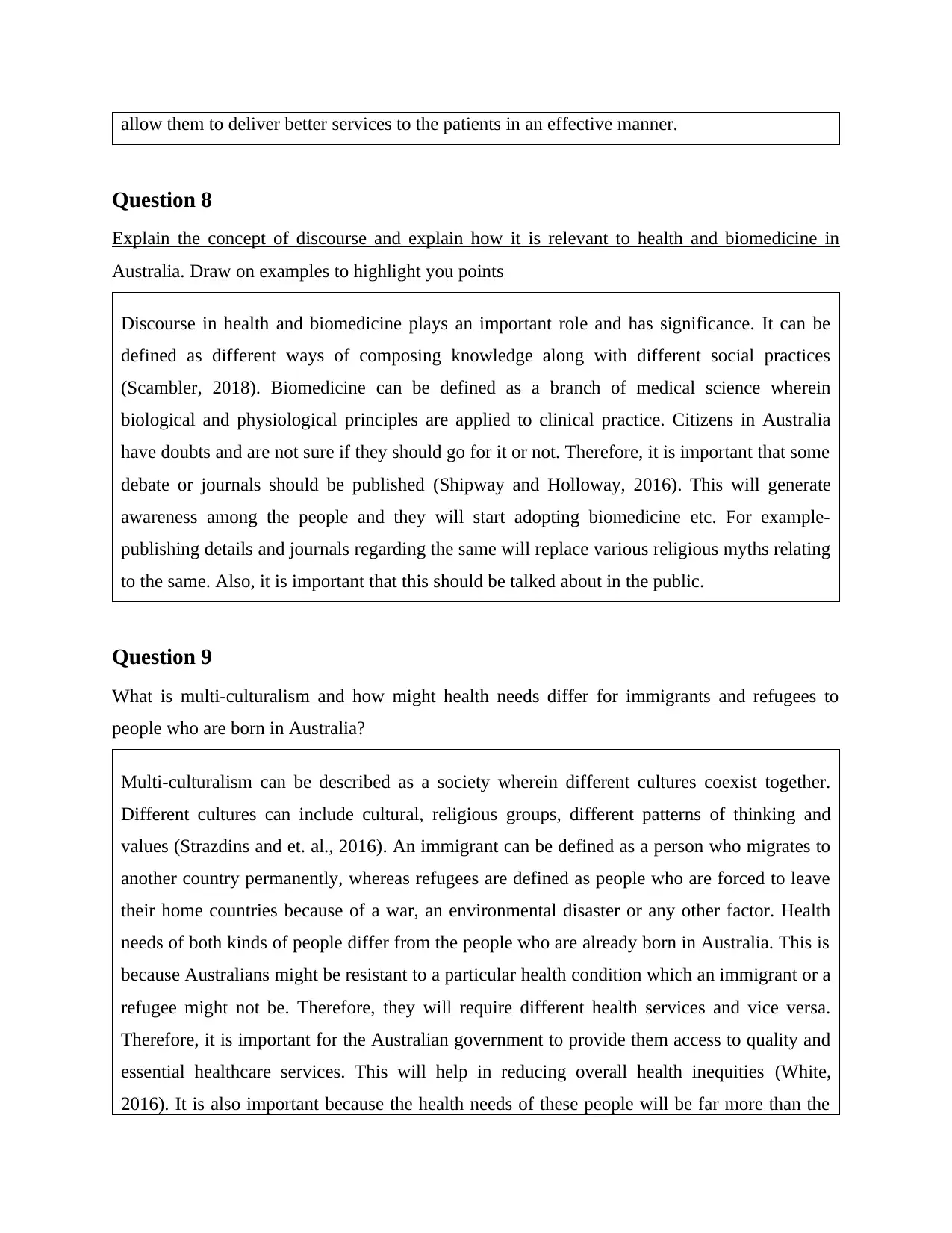
allow them to deliver better services to the patients in an effective manner.
Question 8
Explain the concept of discourse and explain how it is relevant to health and biomedicine in
Australia. Draw on examples to highlight you points
Discourse in health and biomedicine plays an important role and has significance. It can be
defined as different ways of composing knowledge along with different social practices
(Scambler, 2018). Biomedicine can be defined as a branch of medical science wherein
biological and physiological principles are applied to clinical practice. Citizens in Australia
have doubts and are not sure if they should go for it or not. Therefore, it is important that some
debate or journals should be published (Shipway and Holloway, 2016). This will generate
awareness among the people and they will start adopting biomedicine etc. For example-
publishing details and journals regarding the same will replace various religious myths relating
to the same. Also, it is important that this should be talked about in the public.
Question 9
What is multi-culturalism and how might health needs differ for immigrants and refugees to
people who are born in Australia?
Multi-culturalism can be described as a society wherein different cultures coexist together.
Different cultures can include cultural, religious groups, different patterns of thinking and
values (Strazdins and et. al., 2016). An immigrant can be defined as a person who migrates to
another country permanently, whereas refugees are defined as people who are forced to leave
their home countries because of a war, an environmental disaster or any other factor. Health
needs of both kinds of people differ from the people who are already born in Australia. This is
because Australians might be resistant to a particular health condition which an immigrant or a
refugee might not be. Therefore, they will require different health services and vice versa.
Therefore, it is important for the Australian government to provide them access to quality and
essential healthcare services. This will help in reducing overall health inequities (White,
2016). It is also important because the health needs of these people will be far more than the
Question 8
Explain the concept of discourse and explain how it is relevant to health and biomedicine in
Australia. Draw on examples to highlight you points
Discourse in health and biomedicine plays an important role and has significance. It can be
defined as different ways of composing knowledge along with different social practices
(Scambler, 2018). Biomedicine can be defined as a branch of medical science wherein
biological and physiological principles are applied to clinical practice. Citizens in Australia
have doubts and are not sure if they should go for it or not. Therefore, it is important that some
debate or journals should be published (Shipway and Holloway, 2016). This will generate
awareness among the people and they will start adopting biomedicine etc. For example-
publishing details and journals regarding the same will replace various religious myths relating
to the same. Also, it is important that this should be talked about in the public.
Question 9
What is multi-culturalism and how might health needs differ for immigrants and refugees to
people who are born in Australia?
Multi-culturalism can be described as a society wherein different cultures coexist together.
Different cultures can include cultural, religious groups, different patterns of thinking and
values (Strazdins and et. al., 2016). An immigrant can be defined as a person who migrates to
another country permanently, whereas refugees are defined as people who are forced to leave
their home countries because of a war, an environmental disaster or any other factor. Health
needs of both kinds of people differ from the people who are already born in Australia. This is
because Australians might be resistant to a particular health condition which an immigrant or a
refugee might not be. Therefore, they will require different health services and vice versa.
Therefore, it is important for the Australian government to provide them access to quality and
essential healthcare services. This will help in reducing overall health inequities (White,
2016). It is also important because the health needs of these people will be far more than the
Paraphrase This Document
Need a fresh take? Get an instant paraphrase of this document with our AI Paraphraser
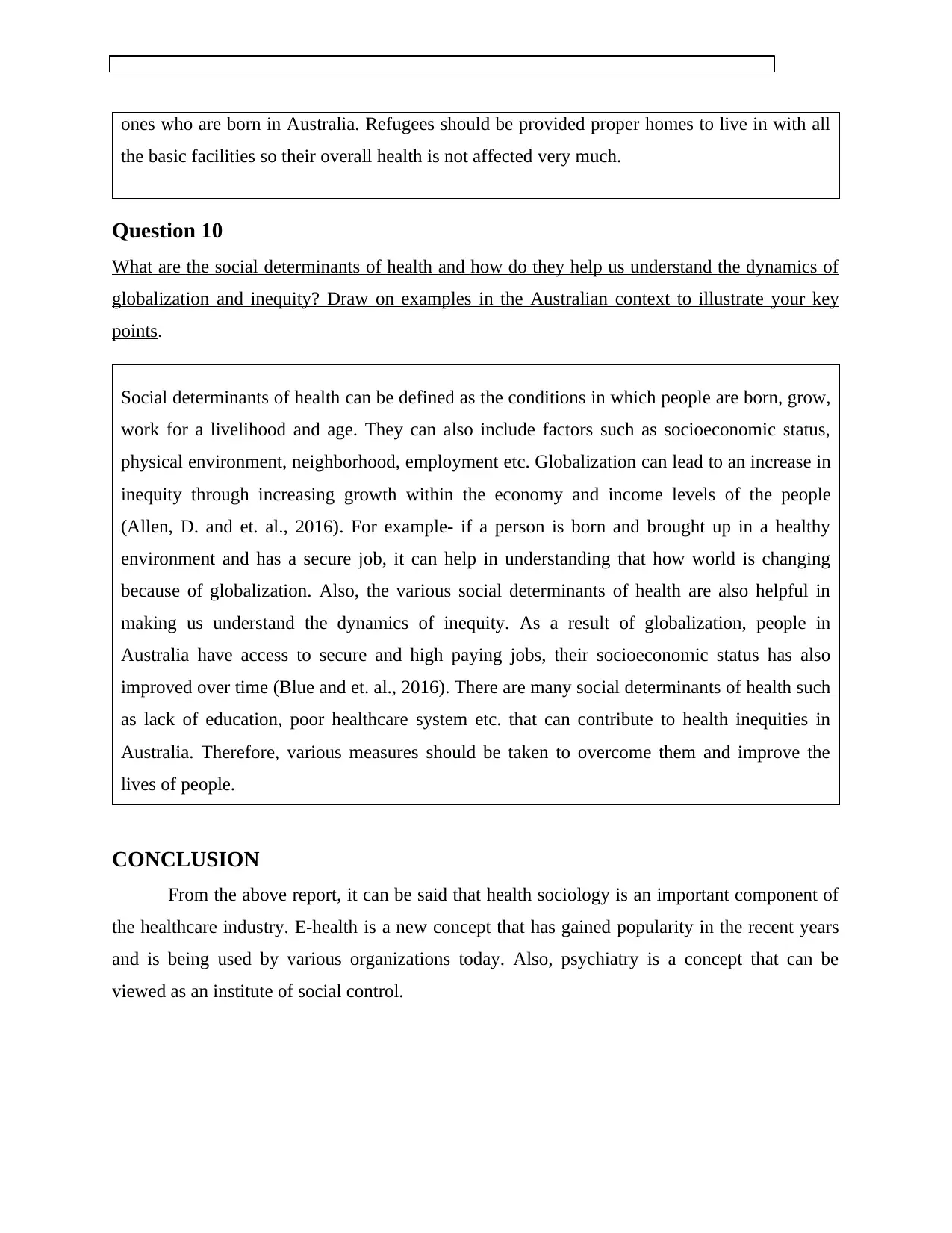
ones who are born in Australia. Refugees should be provided proper homes to live in with all
the basic facilities so their overall health is not affected very much.
Question 10
What are the social determinants of health and how do they help us understand the dynamics of
globalization and inequity? Draw on examples in the Australian context to illustrate your key
points.
Social determinants of health can be defined as the conditions in which people are born, grow,
work for a livelihood and age. They can also include factors such as socioeconomic status,
physical environment, neighborhood, employment etc. Globalization can lead to an increase in
inequity through increasing growth within the economy and income levels of the people
(Allen, D. and et. al., 2016). For example- if a person is born and brought up in a healthy
environment and has a secure job, it can help in understanding that how world is changing
because of globalization. Also, the various social determinants of health are also helpful in
making us understand the dynamics of inequity. As a result of globalization, people in
Australia have access to secure and high paying jobs, their socioeconomic status has also
improved over time (Blue and et. al., 2016). There are many social determinants of health such
as lack of education, poor healthcare system etc. that can contribute to health inequities in
Australia. Therefore, various measures should be taken to overcome them and improve the
lives of people.
CONCLUSION
From the above report, it can be said that health sociology is an important component of
the healthcare industry. E-health is a new concept that has gained popularity in the recent years
and is being used by various organizations today. Also, psychiatry is a concept that can be
viewed as an institute of social control.
the basic facilities so their overall health is not affected very much.
Question 10
What are the social determinants of health and how do they help us understand the dynamics of
globalization and inequity? Draw on examples in the Australian context to illustrate your key
points.
Social determinants of health can be defined as the conditions in which people are born, grow,
work for a livelihood and age. They can also include factors such as socioeconomic status,
physical environment, neighborhood, employment etc. Globalization can lead to an increase in
inequity through increasing growth within the economy and income levels of the people
(Allen, D. and et. al., 2016). For example- if a person is born and brought up in a healthy
environment and has a secure job, it can help in understanding that how world is changing
because of globalization. Also, the various social determinants of health are also helpful in
making us understand the dynamics of inequity. As a result of globalization, people in
Australia have access to secure and high paying jobs, their socioeconomic status has also
improved over time (Blue and et. al., 2016). There are many social determinants of health such
as lack of education, poor healthcare system etc. that can contribute to health inequities in
Australia. Therefore, various measures should be taken to overcome them and improve the
lives of people.
CONCLUSION
From the above report, it can be said that health sociology is an important component of
the healthcare industry. E-health is a new concept that has gained popularity in the recent years
and is being used by various organizations today. Also, psychiatry is a concept that can be
viewed as an institute of social control.
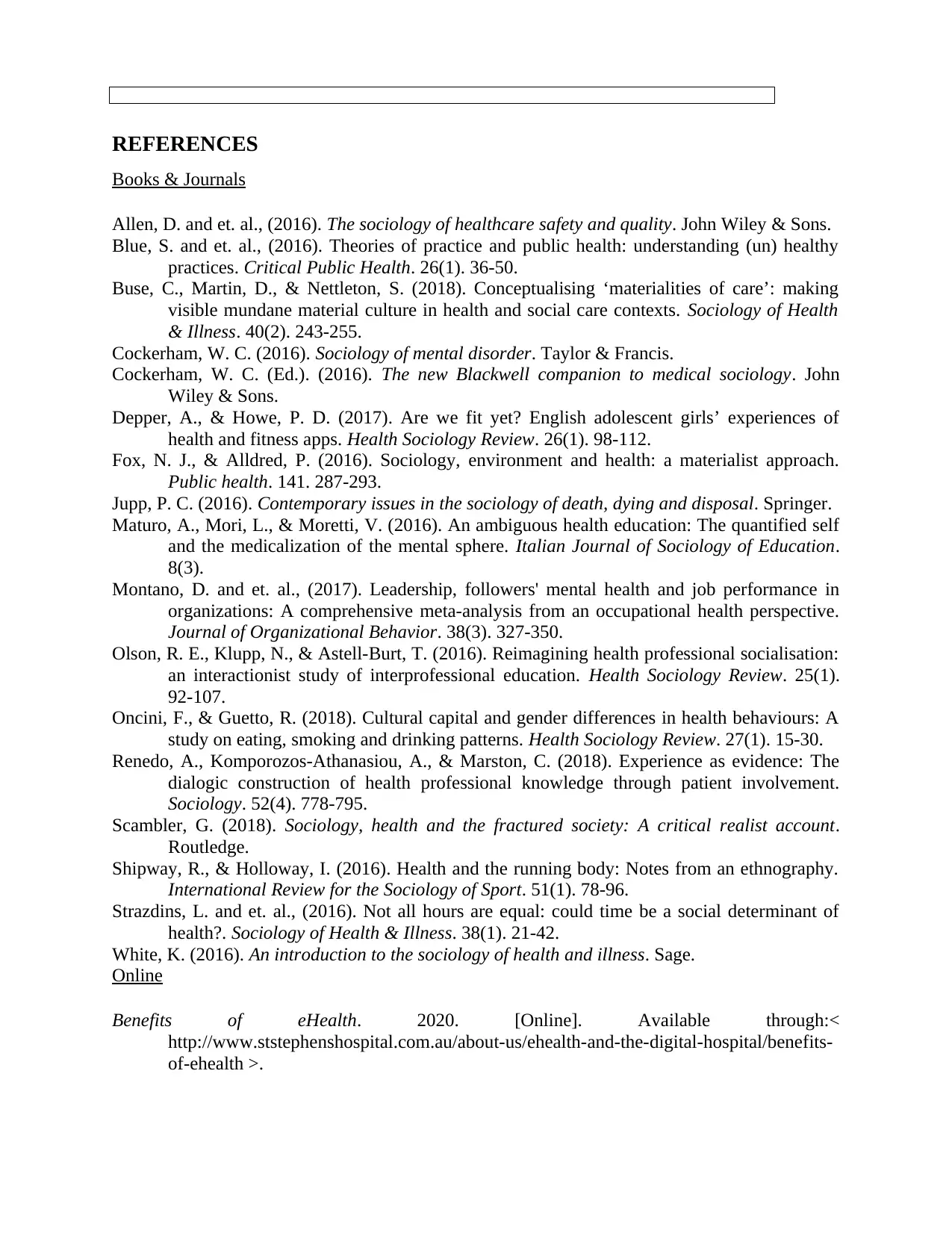
REFERENCES
Books & Journals
Allen, D. and et. al., (2016). The sociology of healthcare safety and quality. John Wiley & Sons.
Blue, S. and et. al., (2016). Theories of practice and public health: understanding (un) healthy
practices. Critical Public Health. 26(1). 36-50.
Buse, C., Martin, D., & Nettleton, S. (2018). Conceptualising ‘materialities of care’: making
visible mundane material culture in health and social care contexts. Sociology of Health
& Illness. 40(2). 243-255.
Cockerham, W. C. (2016). Sociology of mental disorder. Taylor & Francis.
Cockerham, W. C. (Ed.). (2016). The new Blackwell companion to medical sociology. John
Wiley & Sons.
Depper, A., & Howe, P. D. (2017). Are we fit yet? English adolescent girls’ experiences of
health and fitness apps. Health Sociology Review. 26(1). 98-112.
Fox, N. J., & Alldred, P. (2016). Sociology, environment and health: a materialist approach.
Public health. 141. 287-293.
Jupp, P. C. (2016). Contemporary issues in the sociology of death, dying and disposal. Springer.
Maturo, A., Mori, L., & Moretti, V. (2016). An ambiguous health education: The quantified self
and the medicalization of the mental sphere. Italian Journal of Sociology of Education.
8(3).
Montano, D. and et. al., (2017). Leadership, followers' mental health and job performance in
organizations: A comprehensive meta‐analysis from an occupational health perspective.
Journal of Organizational Behavior. 38(3). 327-350.
Olson, R. E., Klupp, N., & Astell-Burt, T. (2016). Reimagining health professional socialisation:
an interactionist study of interprofessional education. Health Sociology Review. 25(1).
92-107.
Oncini, F., & Guetto, R. (2018). Cultural capital and gender differences in health behaviours: A
study on eating, smoking and drinking patterns. Health Sociology Review. 27(1). 15-30.
Renedo, A., Komporozos-Athanasiou, A., & Marston, C. (2018). Experience as evidence: The
dialogic construction of health professional knowledge through patient involvement.
Sociology. 52(4). 778-795.
Scambler, G. (2018). Sociology, health and the fractured society: A critical realist account.
Routledge.
Shipway, R., & Holloway, I. (2016). Health and the running body: Notes from an ethnography.
International Review for the Sociology of Sport. 51(1). 78-96.
Strazdins, L. and et. al., (2016). Not all hours are equal: could time be a social determinant of
health?. Sociology of Health & Illness. 38(1). 21-42.
White, K. (2016). An introduction to the sociology of health and illness. Sage.
Online
Benefits of eHealth. 2020. [Online]. Available through:<
http://www.ststephenshospital.com.au/about-us/ehealth-and-the-digital-hospital/benefits-
of-ehealth >.
Books & Journals
Allen, D. and et. al., (2016). The sociology of healthcare safety and quality. John Wiley & Sons.
Blue, S. and et. al., (2016). Theories of practice and public health: understanding (un) healthy
practices. Critical Public Health. 26(1). 36-50.
Buse, C., Martin, D., & Nettleton, S. (2018). Conceptualising ‘materialities of care’: making
visible mundane material culture in health and social care contexts. Sociology of Health
& Illness. 40(2). 243-255.
Cockerham, W. C. (2016). Sociology of mental disorder. Taylor & Francis.
Cockerham, W. C. (Ed.). (2016). The new Blackwell companion to medical sociology. John
Wiley & Sons.
Depper, A., & Howe, P. D. (2017). Are we fit yet? English adolescent girls’ experiences of
health and fitness apps. Health Sociology Review. 26(1). 98-112.
Fox, N. J., & Alldred, P. (2016). Sociology, environment and health: a materialist approach.
Public health. 141. 287-293.
Jupp, P. C. (2016). Contemporary issues in the sociology of death, dying and disposal. Springer.
Maturo, A., Mori, L., & Moretti, V. (2016). An ambiguous health education: The quantified self
and the medicalization of the mental sphere. Italian Journal of Sociology of Education.
8(3).
Montano, D. and et. al., (2017). Leadership, followers' mental health and job performance in
organizations: A comprehensive meta‐analysis from an occupational health perspective.
Journal of Organizational Behavior. 38(3). 327-350.
Olson, R. E., Klupp, N., & Astell-Burt, T. (2016). Reimagining health professional socialisation:
an interactionist study of interprofessional education. Health Sociology Review. 25(1).
92-107.
Oncini, F., & Guetto, R. (2018). Cultural capital and gender differences in health behaviours: A
study on eating, smoking and drinking patterns. Health Sociology Review. 27(1). 15-30.
Renedo, A., Komporozos-Athanasiou, A., & Marston, C. (2018). Experience as evidence: The
dialogic construction of health professional knowledge through patient involvement.
Sociology. 52(4). 778-795.
Scambler, G. (2018). Sociology, health and the fractured society: A critical realist account.
Routledge.
Shipway, R., & Holloway, I. (2016). Health and the running body: Notes from an ethnography.
International Review for the Sociology of Sport. 51(1). 78-96.
Strazdins, L. and et. al., (2016). Not all hours are equal: could time be a social determinant of
health?. Sociology of Health & Illness. 38(1). 21-42.
White, K. (2016). An introduction to the sociology of health and illness. Sage.
Online
Benefits of eHealth. 2020. [Online]. Available through:<
http://www.ststephenshospital.com.au/about-us/ehealth-and-the-digital-hospital/benefits-
of-ehealth >.
⊘ This is a preview!⊘
Do you want full access?
Subscribe today to unlock all pages.

Trusted by 1+ million students worldwide
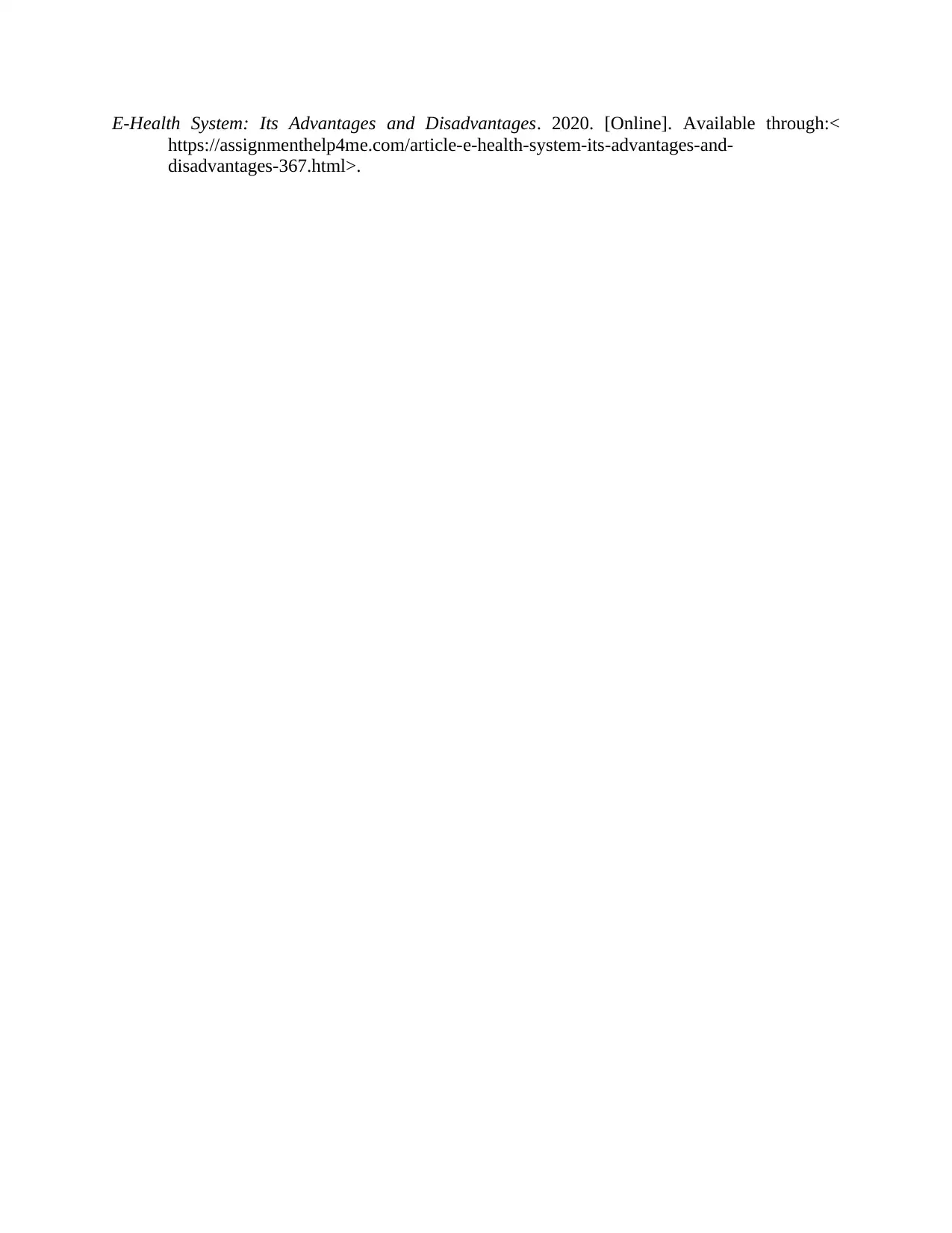
E-Health System: Its Advantages and Disadvantages. 2020. [Online]. Available through:<
https://assignmenthelp4me.com/article-e-health-system-its-advantages-and-
disadvantages-367.html>.
https://assignmenthelp4me.com/article-e-health-system-its-advantages-and-
disadvantages-367.html>.
1 out of 10
Related Documents
Your All-in-One AI-Powered Toolkit for Academic Success.
+13062052269
info@desklib.com
Available 24*7 on WhatsApp / Email
![[object Object]](/_next/static/media/star-bottom.7253800d.svg)
Unlock your academic potential
Copyright © 2020–2025 A2Z Services. All Rights Reserved. Developed and managed by ZUCOL.





